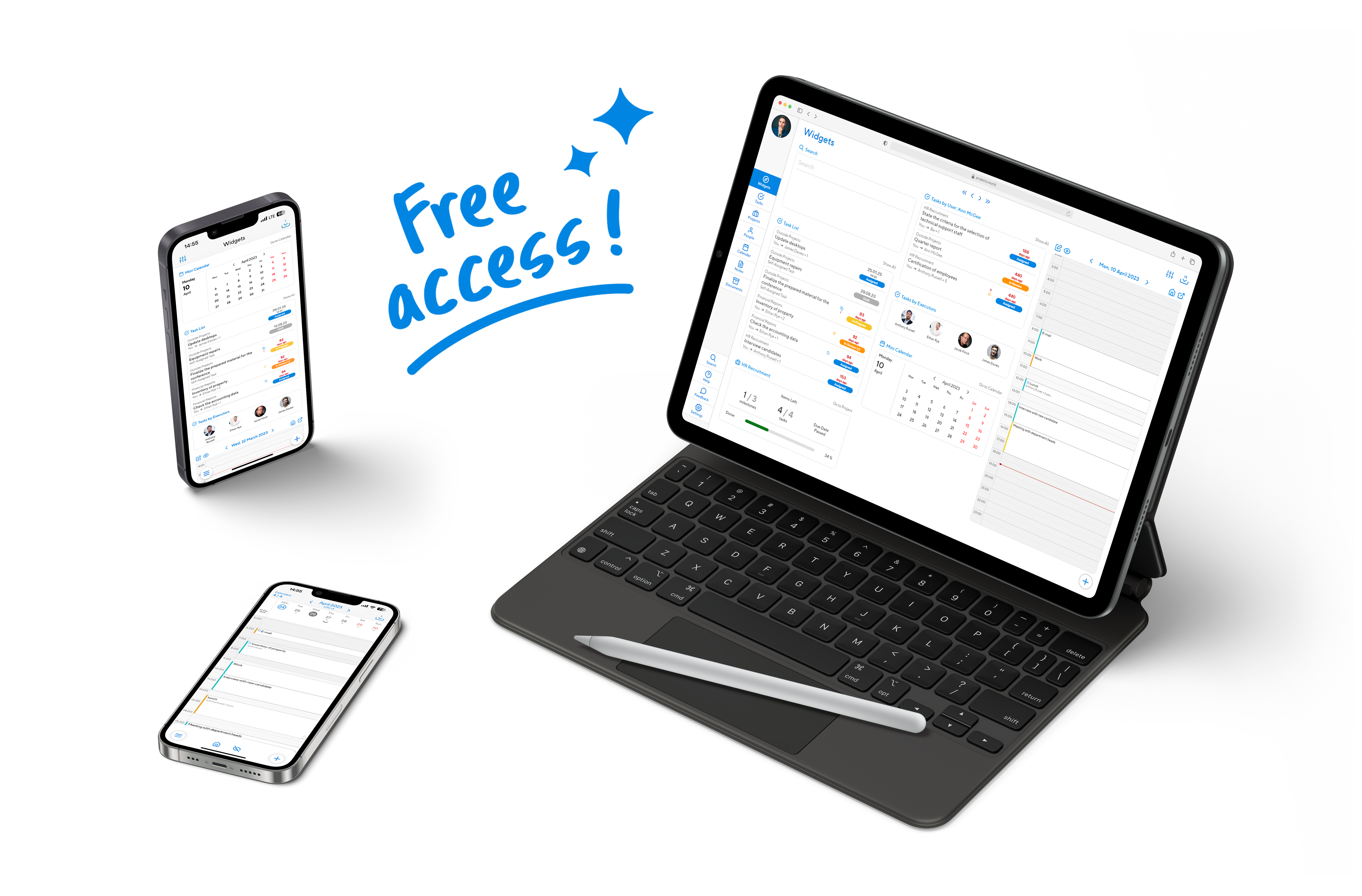Monday (formerly daPulse) is an Israeli startup that has grown into a unicorn company in 2019 (market valuation of over $1 billion). Its main product is a cloud environment for building a suite of applications for managing work projects and tasks, called Work OS.
The work tools embedded in Work OS include: its own CRM system, tools for marketers, programmers, IT teams, designers, forms for collecting feedback, a system for automating business processes, a data and document repository, ready-made mobile applications, a system for sending notifications, etc.
It is, in fact, a task manager or project management software, but in a form that can be brought to perfection thanks to flexible customisation and a low-code/no-code approach. On top of that, all this is effectively complemented by an API and a ton of out-of-the-box integrations. Monday can be used to create a complete infrastructure for comprehensive management of an organisation of any orientation and functionality.
But we can offer a more convenient alternative to Monday.
Benefits and features of Monday
Let’s start by telling you exactly what Monday’s service offered, so you can compare it.
The startup was founded in 2012 in Israel, and the first official release of the platform took place in 2014 (development took 2 years). After a number of successful funding rounds, the company received sufficient financial injections and started developing a number of related products.
The initial solution for task planning (Work Management) was complemented by Monday Dev developer services, Monday Sales CRM, Monday Marketer tools and Monday Projects project management system. Later, a platform for design teams (WorkCanvas) and a platform for working with web forms (WorkForms) were added.
WorkOS tools are linked together to form a single platform, hence the name ‘Work OS’. However, it should be recognised that only large corporate customers will be able to discover the full potential of this approach.
The key feature of the Monday platform is that it is completely customisable. Each workflow within the system can be broken down into its components and configured the way your business needs it, and each department or team can have its own technical nuances. If you wish, you can integrate existing software (via APIs, forms or ready-made modules from the catalogue) into the unified ecosystem.
So, what opportunities are available at Work OS (Monday):
- Reliable, cloud-based SaaS service that meets enterprise application standards.
- Ability to build workflows and rooms from functional blocks. All customisation is done in graphical mode (no code approach). If you need to integrate with existing enterprise software, there is a minimum of code, everything is written to common standards (low-code approach).
- Work OS has many options for automating workflows: triggers and actions (including repeating actions), scripts and tasks.
- More than 200 ready-to-use templates for different situations. It’s easy to get started with a minimum of customisation and editing.
- Huge number of built-in data types (more than 20 field variants). Each of these can be used to build workspaces. In addition, data in cells can be calculated using formulas (there is a special column type for this).
- Fine-tune access rights and the ability to create independent teams within the same organisation.
- Task and project display options — Kanban board, table with customisable columns, Gantt chart, calendar, map panel and timeline.
- Over 200 out-of-the-box integrations and a dedicated app marketplace.
- Integrated cloud storage for documents.
- Tools for collecting information from web forms. Can be used for organising feedback, embedding in websites, working with CRM, etc.
- Live annotations on images (with indication of position in the image).
- Built-in system for sending email newsletters, which can be easily integrated with external email services.
- Report and document generation tools that can embed workflow blocks and diagrams.
- Out-of-the-box mobile applications.
- Unlimited guest (viewer) accounts.
- Two-factor authorisation and login systems with enterprise-level security.
- Advanced administration capabilities (logging, auditing actions, setting access rights, etc.).
- Data import and export.
- Ability to create tasks by email.
The disadvantages of the Monday platform are as follows:
- Too complicated to set up jobs. The company has to spend a lot of time and effort to move the planning to Monday. The availability of ready-made templates does not help much. Users need more time to learn the basics.
- All the system’s plans have strict limits on disk space. The number of automation operations and API calls is also limited.
- Platform features are divided by plans.
- Monday’s main products are different but related systems. Each has its own fees and features. For example, forms and CRM are paid for separately.
- There is no org chart builder.
- The document repository does not track the history of file changes and is of little help in reconciling files and communicating with stakeholders (no EDMS functionality).
- Prices are too high even for Western users.
- Payment for services is only made on the basis of user packages. It is simply impossible to buy below a certain threshold.
The best alternative to Monday today
There’s no point in arguing, Monday’s platform is as good as its direct competitors, such as Asana, Wrike or Trello. It is a big, reliable service that maximises functionality and does its job perfectly. But it is mostly for large companies.
The best alternative for small and medium-sized businesses would be a simpler and necessarily off-the-shelf solution that works without complicated setup and implementation. For example, the Projecto platform can claim the status of the best project management service.
Prices are affordable and no training is required.
Projecto’s capabilities
- This is a cloud-based solution, all servers where data is stored are securelyprotected.
- A convenient and fully operational task delegation system. This is not some mythical business process, but an interactive tree of all subordinate tasks. There is simply no need for customisation.
- End-to-end search with easy filtering by content type.
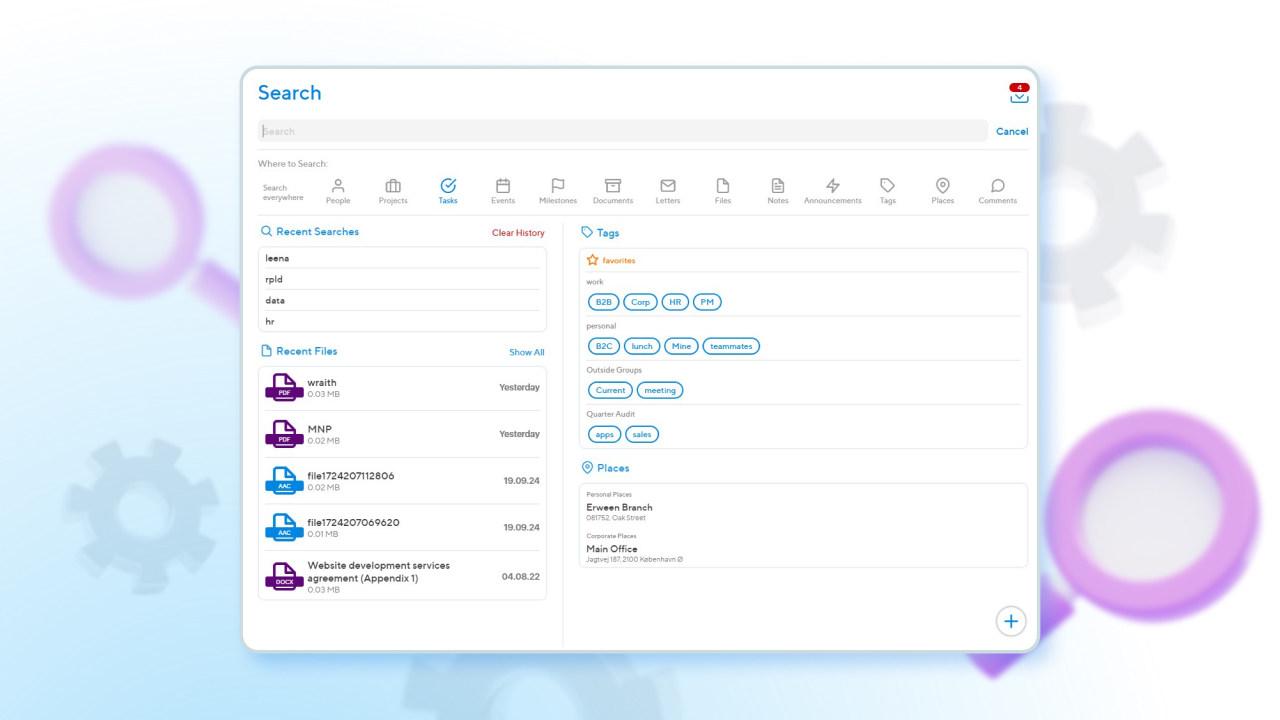
- All the display options you need: Gantt chart, list/table, calendar and Kanban board.
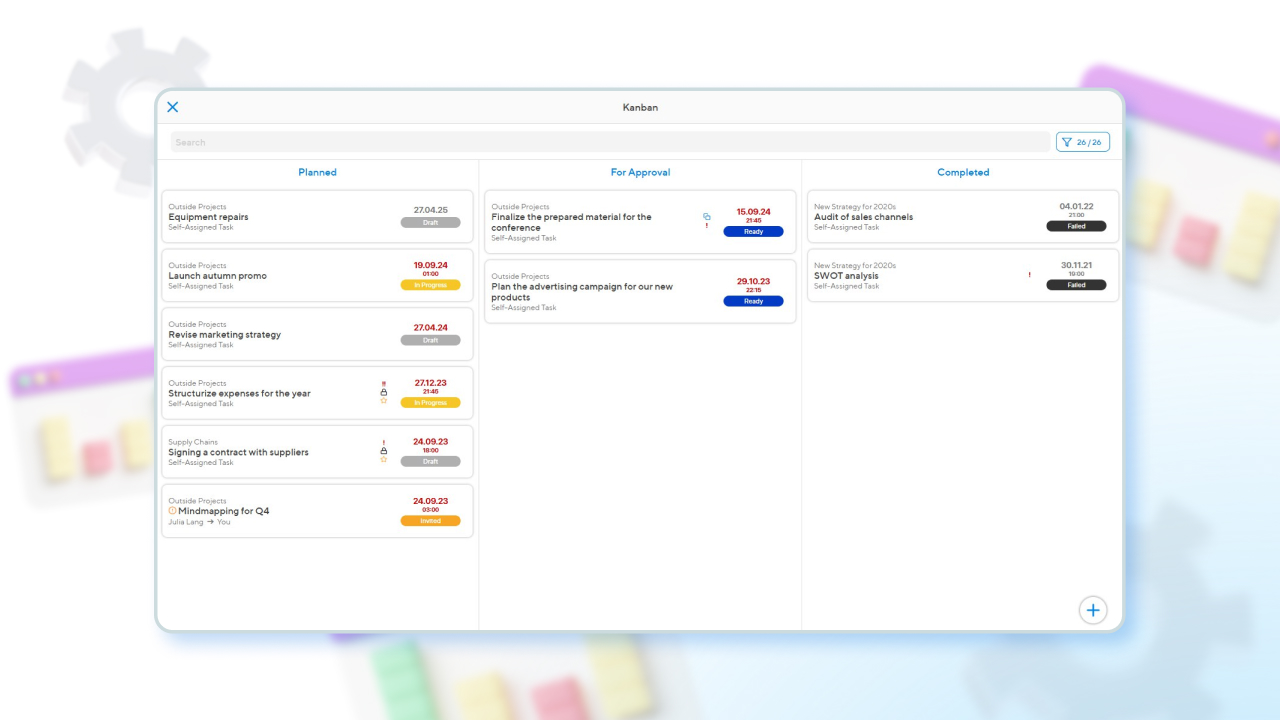
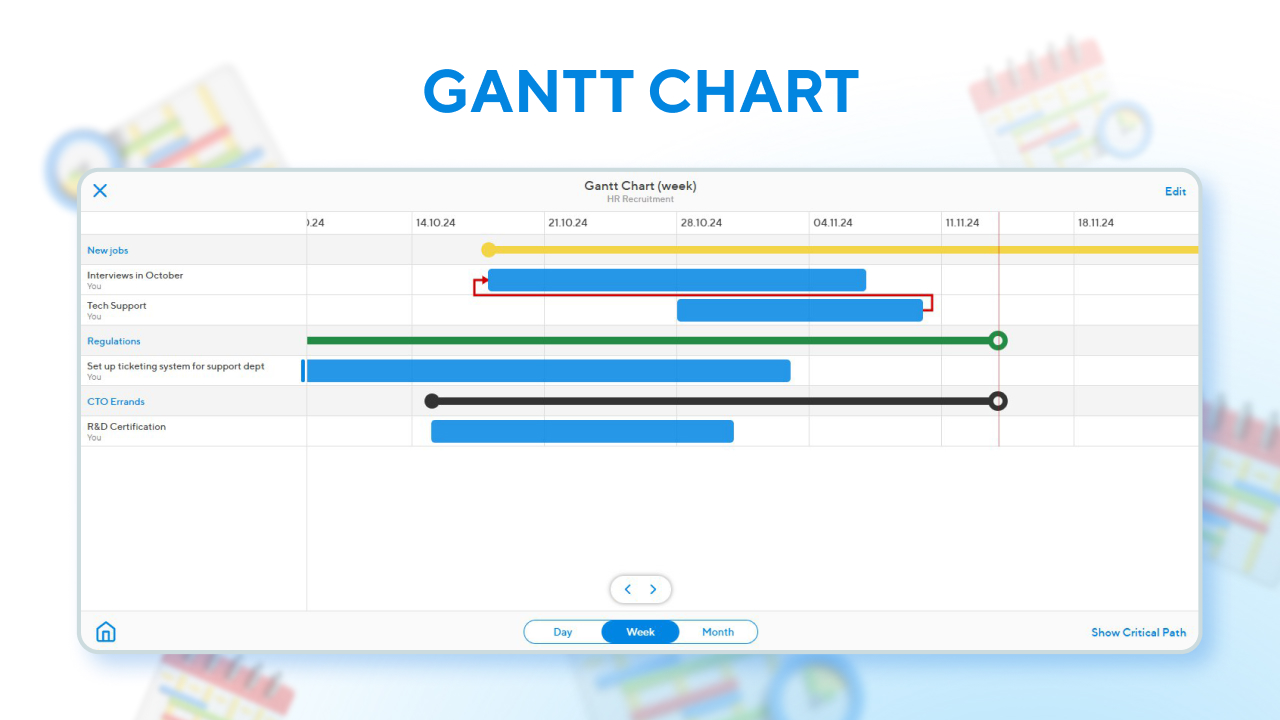
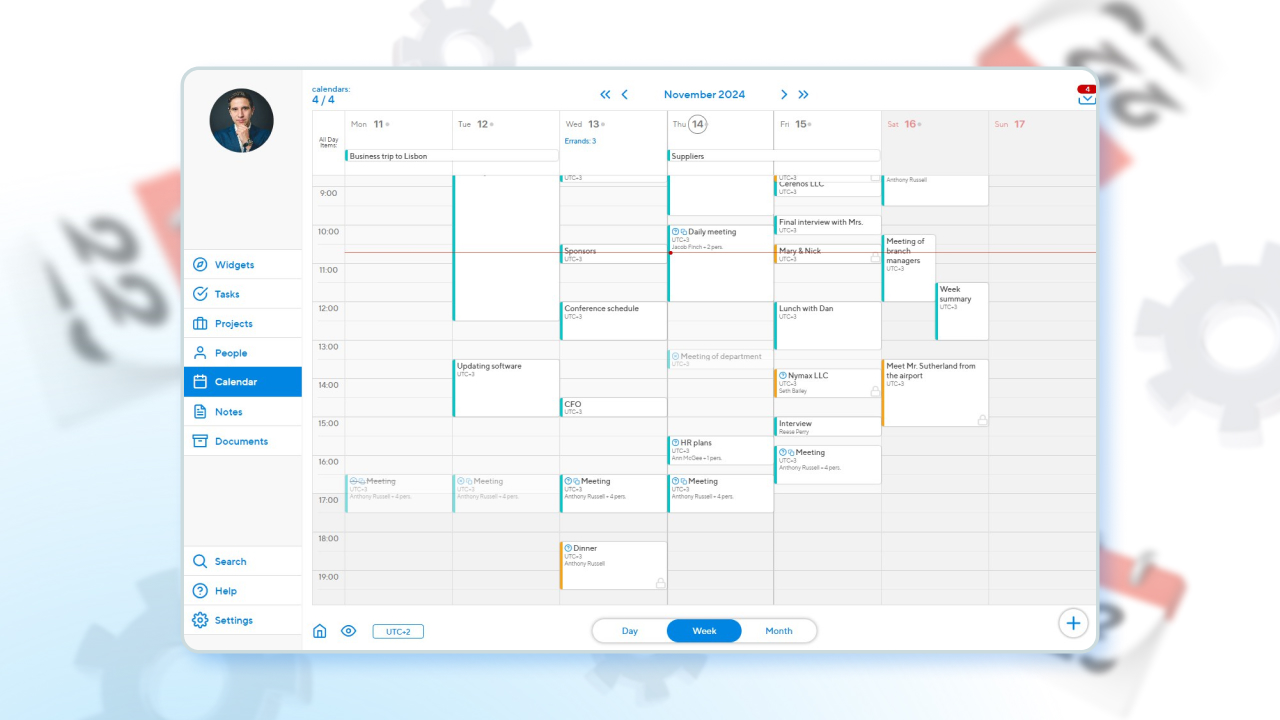
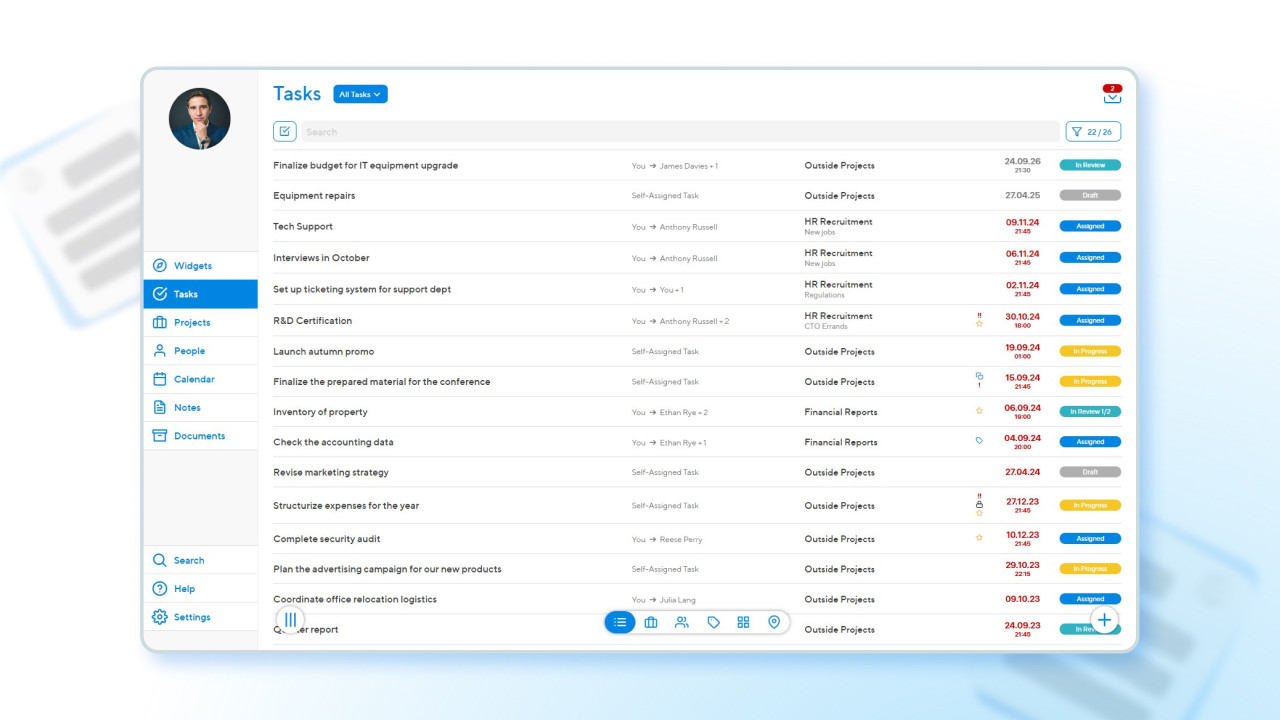
- Ready-to-use visual constructor of the company’s organisational structure.
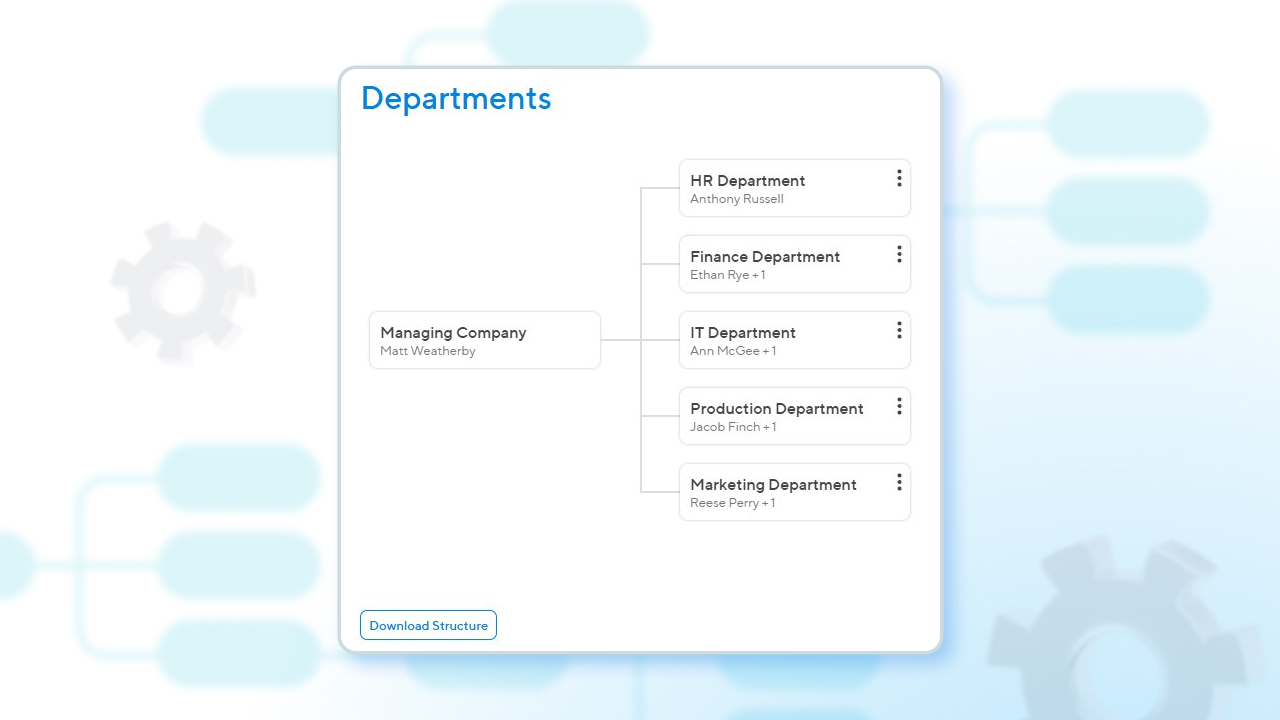
- Detailed and convenient employee cards will be useful not only for HR managers and managers, but also for employees themselves.
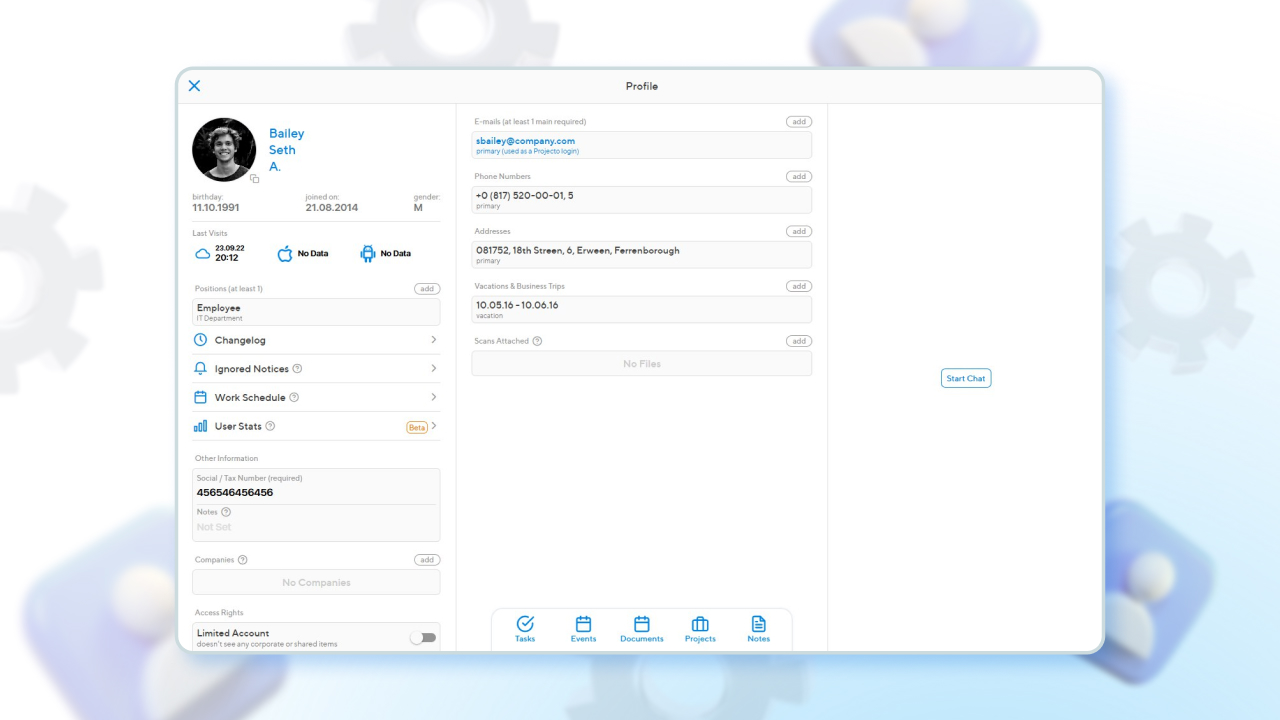
- Subordinates may refuse a task assigned to them by stating the reason.
- When someone leaves the company, a special script helps to redistribute or close any remaining unfinished tasks and projects.
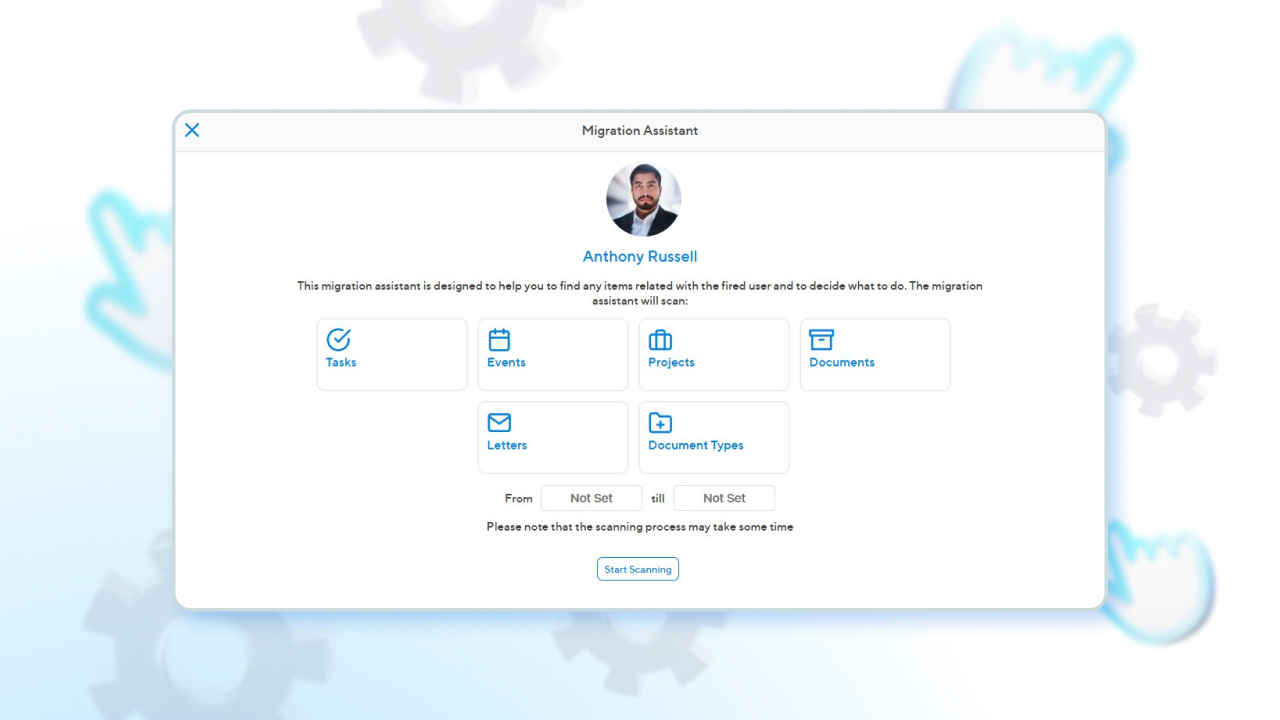
- Unlimited file and attachment storage.
- Tasks can be repeated at a set cycle.
- Allocation of access rights.
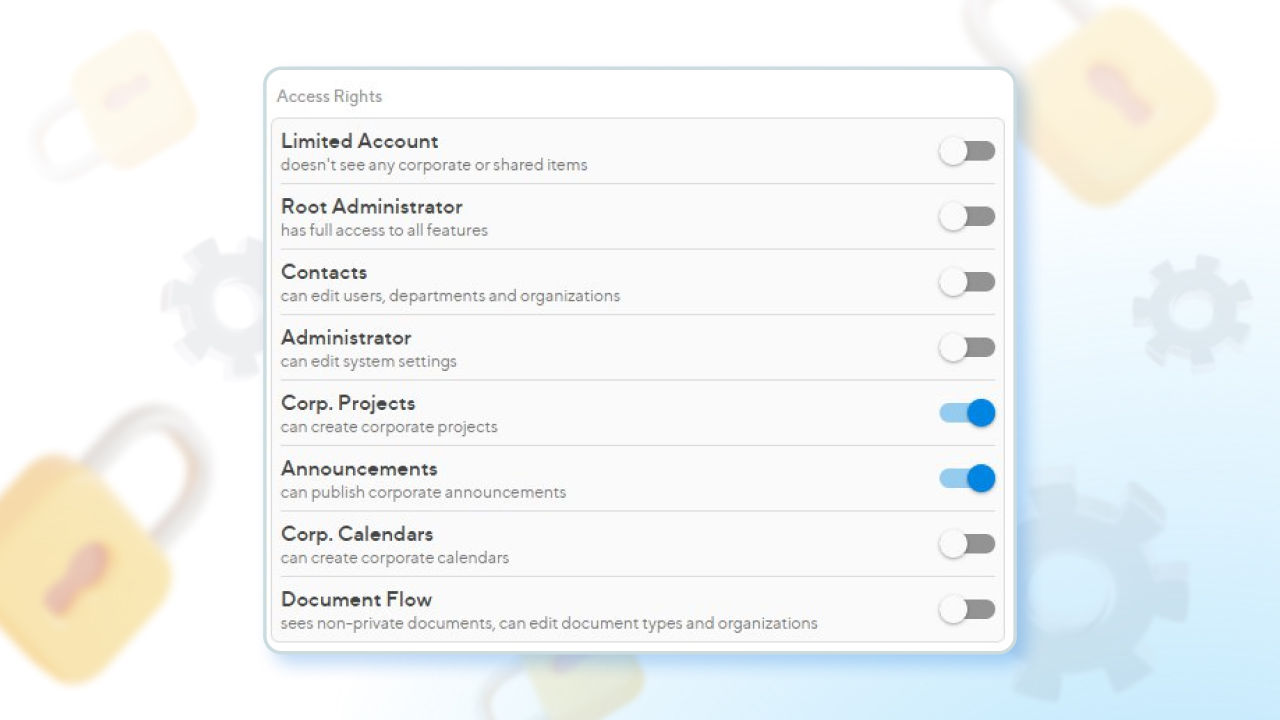
- Define and control tasks with a delegation system.
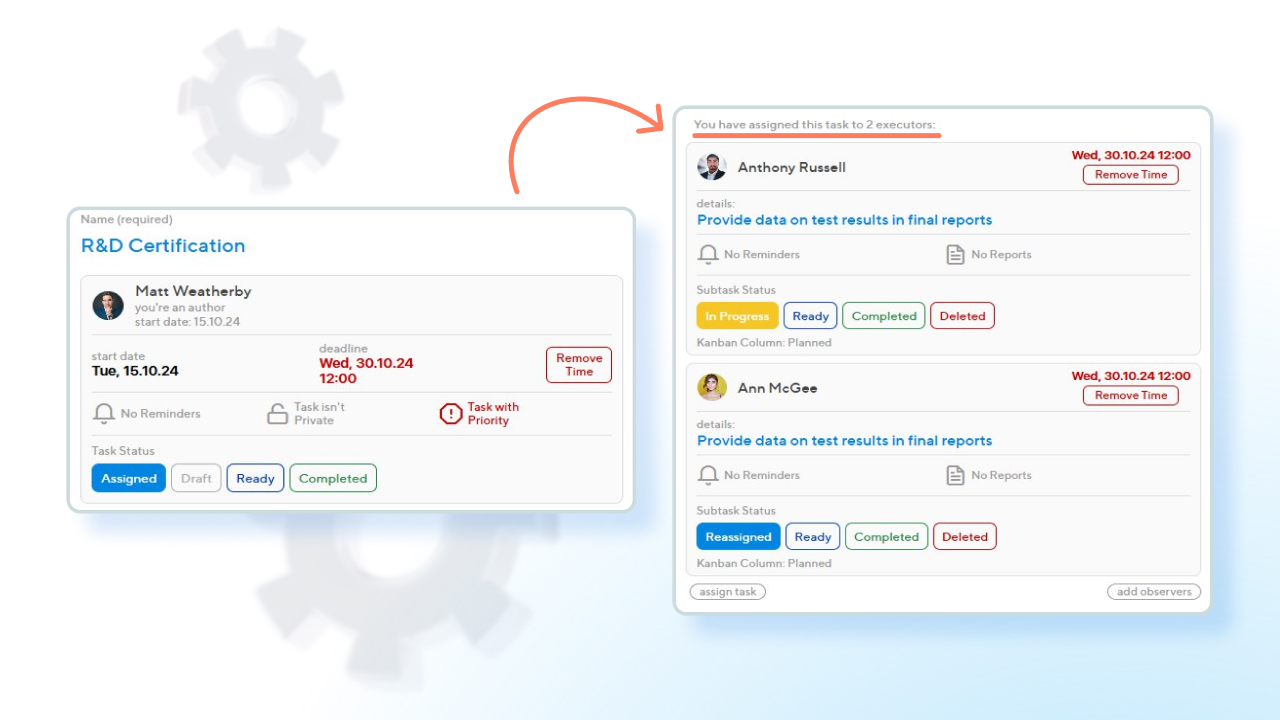
- Built-in document accounting system with flexible, customisable cards. It can also be used to record incoming correspondence (letters). It is able to store, co-ordinate, receive and forward documents to the appropriate people.
- Mobile applications that provide the same functionality as the web version of the service.
- System for importing and exporting contacts and exporting tasks and projects.
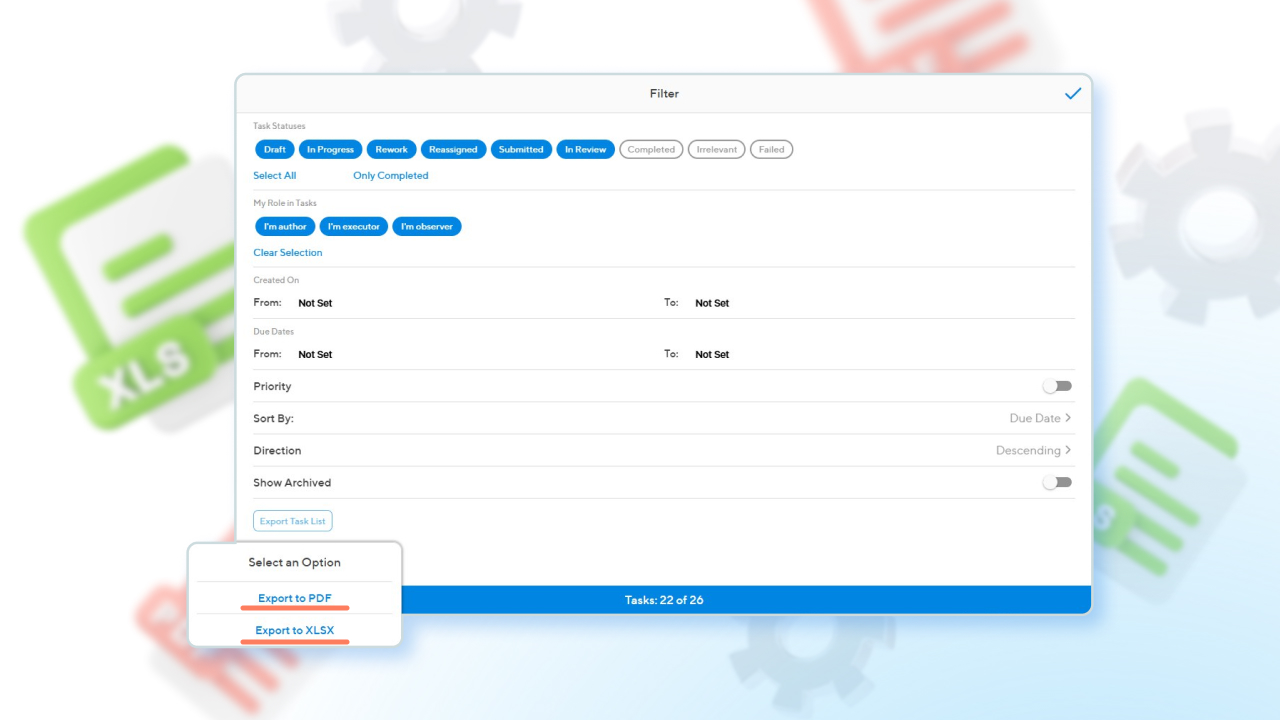
- There is no division of functionality by tariff. All system features are available to you without restriction.
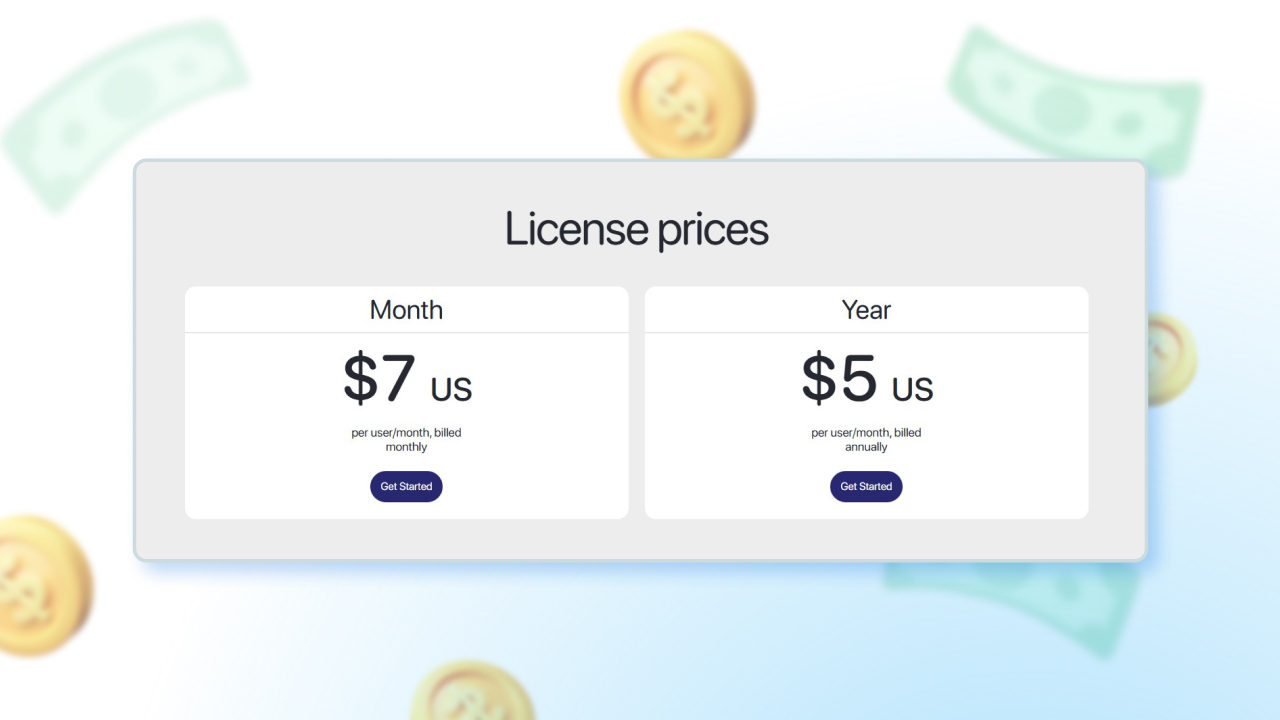
Projecto also has a handy demo version that doesn’t require registration or any other unnecessary actions. If you are not satisfied with the ‘general’ format, you can use the registration and free 30-day trial.
A comparison of Projecto and Monday
| Monday | Projecto | |
| Hosting Format | Cloud-based | Cloud-based |
| Display options | Gantt Chart Kanban Table Calendar Cards Time Chart | Gantt chart Kanban List Calendar |
| Mobile apps | Android and iOS | Android and iOS, just as good as the web version |
| Chat and discussions | Chat per project, per subproject and per file | Convenient chat for each entity |
| File storage | Disk space is always limited, but external cloud storage can be integrated | Built-in, without strict limits |
| Organisational chart builder | No | Built-in visual builder |
| Document section | Documents are kind of dashboards, with their own widgets and discussions | User-friendly document management system with customisable cards and fields |
| Collegial acceptance of results | No | Yes |
| Reports on the status of tasks/projects | Basic and customisable reports | Prepared reports and feedback request system |
| Free plan | No more than 2 participants (suitable only for personal use and to familiarise yourself with the system’s functionality).Trial on any premium tariff — up to 14 days. | Free demo without registration. 30-day trial. |
| Subscriptions cost per month | Each product has its own tariffs: basic task management and scheduling product — from 8 to 20 USD/month (depending on tariff, number of workstations and prepayment period), sold in packages (minimum 3 workstations). | 5-7 USD/month depending on number of licences and prepayment period |
Monday’s free plan is for personal use or micro-teams only. For the most important features and to extend the job package, you need to upgrade to a premium subscription. Prices are not the cheapest. Therefore, the best alternative to the Monday service for small and medium businesses is the Projecto cloud service.
